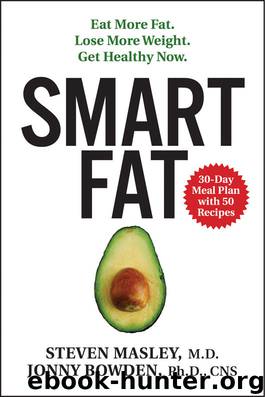Smart Fat: Eat More Fat. Lose More Weight. Get Healthy Now. by Steven Masley M.D & Bowden Jonny PhD

Author:Steven Masley M.D & Bowden, Jonny, PhD [Masley M.D, Steven]
Language: eng
Format: azw3
Publisher: HarperCollins
Published: 2016-01-19T05:00:00+00:00
Multivitamins
If you want to meet some basic vitamin and mineral needs all at once, a multivitamin is a great place to start. However, no single multivitamin will have enough of every vitamin and mineral that your body needs. For example, some minerals, such as calcium and magnesium, are made up of molecules that are literally too big to fit into a multivitamin, at least in doses that would be meaningful. If you’ve ever wondered why some tablets and capsules look like “horse pills,” it’s usually because the molecular structure of the active ingredients is naturally large, complex, and bulky. Ideally, pills shouldn’t be too big to swallow comfortably. That’s why the “serving size” on some high-quality multivitamins is often two to three pills (or more).
One of the reasons your personal physician may not recommend a multivitamin is that most multivitamin studies to date have been done using multivitamins with very poor-quality ingredients that neither of us would recommend. Studies using a poor-quality multivitamin did not decrease the risk of heart attacks and strokes, and these no-benefit studies received a very high level of coverage in the medical literature. For reasons we fail to understand, researchers designing large-scale multivitamin studies in the past have insisted that the ingredients combined had to be ultra-cheap (usually as low as pennies per day), which obviously limits their effectiveness. Furthermore, getting people to volunteer for a multivitamin study is very difficult. A study published in the prestigious Journal of the American Medical Association showed that people enrolling for multivitamin studies ate vastly better than average Americans in the first place, which greatly limited the benefit that would have been shown for the average American.
Yet, despite the poor-quality ingredients used, national multivitamin studies have revealed more benefits than your doctor may want to admit. Solid studies have shown that taking even a poor-quality multivitamin daily decreases your risk for cancer and decreases damage to your DNA. We believe the benefits of taking a high-quality multivitamin greatly outweigh any risk, and we highly recommend that you take a multivitamin daily.
Some ingredients suggest that a supplement is being made with inferior ingredients, similar to those used in the national studies noted. When you see these, start looking for a better quality supplement brand. Here are a few examples:
Beta carotene → Instead, look for mixed carotenoids.
Alpha tocopherol → Instead, look for mixed tocopherols.
Magnesium oxide → Instead, look for magnesium citrate, magnesium glycinate, magnesium malate, or a chelated form of magnesium.
Folic acid → Instead, look for mixed folates. The most absorbable and metabolically active kind of folate is 5-methyltetrahydrofolate.
Zinc-to-copper ratio >10–20 → Instead, look for a zinc-to-copper ratio that is at least 20 or more. Copper and zinc that aren’t in the right balance can increase the risk for cancer. The fact is that you can get all the copper you need from eating healthy food, so if your supplement has zinc and omits copper, that’s just fine (like the foods on the Smart Fat plan). Make sure you have at least 20–25 parts zinc for each part copper.
Download
This site does not store any files on its server. We only index and link to content provided by other sites. Please contact the content providers to delete copyright contents if any and email us, we'll remove relevant links or contents immediately.
Nutrition for Sport, Exercise, and Health by Spano Marie & Kruskall Laura & Thomas D. Travis(3774)
Nutrition for Sport, Exercise, and Health by Marie Spano & Laura Kruskall & D. Travis Thomas(3723)
The Sprouting Book by Ann Wigmore(3587)
Flavor Flours by Alice Medrich(2861)
Superfood Smoothie Bowls: Delicious, Satisfying, Protein-Packed Blends that Boost Energy and Burn Fat by Chace Daniella(2455)
Memory Rescue by Daniel G. Amen(2418)
Dirty Genes by Ben Lynch(2313)
The Bad Food Bible by Aaron Carroll(2271)
Genius Foods by Max Lugavere(2217)
The Poisoner's Handbook by Deborah Blum(2135)
Good Calories, Bad Calories by Gary Taubes(2106)
The Main Street Vegan Academy Cookbook by Victoria Moran(2078)
The I Quit Sugar Cookbook by Sarah Wilson(2038)
Core Performance Essentials by Mark Verstegen(2009)
Memory Rescue: Supercharge Your Brain, Reverse Memory Loss, and Remember What Matters Most by Amen Dr. Daniel G(1974)
Big Girls Do It Stronger by Jasinda Wilder(1954)
Android App Development by Franceschi Hervé J.;(1841)
Sugar Crush by Dr. Richard Jacoby(1795)
Dr. Colbert's Keto Zone Diet by Don Colbert(1651)
